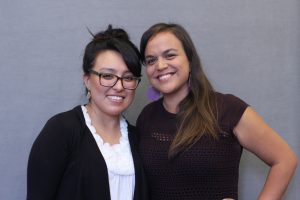Liliana Campos Ramales and Dr. Genevieve Negrón-Gonzales
Recording: November 3, 2016
Transcript
So you had to be separated from your mom in that process.
We had to be separated, right, which is a very familiar thing that I had done previously with my father in saying goodbye. So we said goodbye. And she just said, take care of your brother, no matter what. Scream if anything happens. And we’ll see each other again. That’s all she said.
You don’t worry, mi hija.
We will see each other again.
[MUSIC PLAYING]
My name is Liliana Campos. I’m 29 years old. I was born in Mexico. Mexico City, to be exact. My memories as a child in Mexico are both pleasant and painful. They bring up a lot of vivid memories of our home life, and also the reasons why my family and I decided to cross the border and establish ourselves here in the US.
I can still remember the vivid smell of plastic that covered the children’s books that sat on our dining table. My mom used to sell children’s books. And I didn’t go to school very much as a child. Instead, her and I would go to work. We would walk the streets of Mexico City and go to affluent cities, neighborhoods, and try to sell these children’s books to families and kids.
My father decided to bring us here. He would tell my mom about the stories of just the way that life was so much better here and that he wanted that for us. With the clothes on our back, we left Mexico, got on a plane– the first time that I got on a plane– and went to Tijuana. And we went in waves. So myself and my brother, we were the first ones to leave.
We actually ended up getting trained to go through la linea which is to use someone else’s papers. I don’t think it was until maybe high school that I think I had a better sense of navigating the system and speaking up for myself and reaching out to professors and talking to them about my difficulties, that I started thinking about college. Aside from the fact that I at that point had not disclosed my status to any of my teachers.
I was in AP classes and really worked hard to make sure that I would get into competitive universities. I went to the career services, and the instructor said, well, you’re not going to be able to go to college. That’s just what she said. I disclosed my status to her. I said, I just don’t have a social. I used a fake social to enroll in community college.
And it wasn’t until I transferred to Long Beach State University that I learned about AB 540. But I was like, oh, I’m eligible for in-state tuition.
When I decided to go to college, I think it was life changing for my family. And I think I built a lot of autonomy through that process too.
I feel so empowered by my undocumented identity because it’s challenging, because it’s complex, because it’s provided me opportunities to connect with amazing people, amazing professors. And now that I’m a green card holder, a permanent resident, if you will, I don’t know how this is going to impact my undocumented identity.
My experiences as an undocumented person in this country have deeply shaped my professional interests. I would like to address the psychological experiences of undocumented students, of undocumented young people, the trauma that continues to be perpetuated in this country. I foresee taking on a role, an active role, in continuing to provide spaces where people can feel safe to share their stories, to heal from their stories.
Having to hide who I am has really, yeah, impacted how I see myself in this world, not feeling like I’m a human being, being told that I’m not a human being, having to hide so much in such a developmental– such a critical period in my development as a human being, in high school particularly.
The books that now sit on our dining table, read other words. And then I can open them and dive into stories of pain, of hope, of real stories. And then I can use those books to better the lives of other people as I continue in this work.
[MUSIC PLAYING]
______________
Recorded by StoryCorps in partnership with the Office of Diversity Engagement and Community Outreach
Edited and produced by the Advanced Audio class (USF Media Studies), Julia Brekka, and Professor Beth Hoffman
Want to learn more about Liliana’s journey? Find a recent USF News story by Arvin Temkar here.

